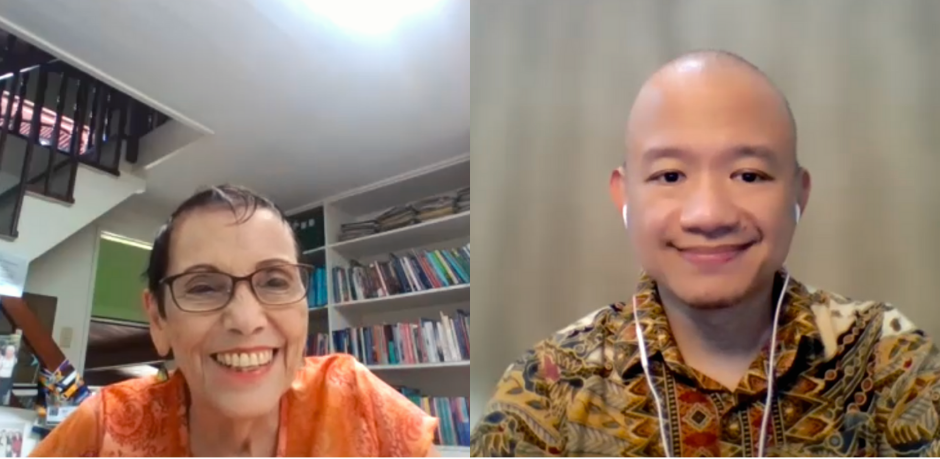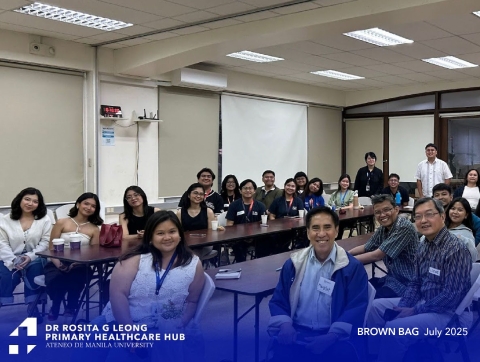The Institute of Philippine Culture through the Years: Transformation, Adaptation, and Impact
27 May 2022 | Karl Eli Alconis
Among the institutions central to Ateneo de Manila University’s thrust to contribute to advancing knowledge with a social justice orientation is the Institute of Philippine Culture (IPC). It is a leading research organization seeking “a better understanding of culture and society in the Philippines and other Asian countries, an improved quality of life for disadvantaged groups, and a more peaceful, just, and equitable national and global society.”

Here, we trace the transformations the institute has undergone to keep up with the challenges of the times and, ultimately, to become what it is today.
When it was founded by anthropologist and Jesuit priest Frank Lynch SJ in 1960, IPC was set up as the research counterpart of the University’s Department of Sociology and Anthropology to address the dearth of empirically grounded research on society in the university. In the beginning, it was primarily dedicated to the systematic investigation of Philippine society and culture. This included grounded ethnographic research and public presentations on Philippine values, as recalled by Prof Mary Racelis, a founding member of the Institute, with most of the studies focusing on the country’s lowland Christian populations. In these pioneering years, the notions of Smooth Interpersonal Relationships (SIR) and Big and Little People as local representations of social class, among others, were developed as ways of understanding the Filipino people.
As the years passed by and theories that questioned the earlier predominance of Structural Functionalism emerged, IPC increasingly tackled questions of social justice. What set it apart from other research entities was its research being informed by liberation theology, espousing social justice from a Christian perspective. The changing contexts also required a reappraisal of the earlier work on values done by the institute, leading, for example, to Social Acceptance Reconsidere. This article by Lynch which brought in new research findings by many other social scientists that substantiated his conceptualization of Philippine society. Process documentation developed at IPC became a pioneering methodological breakthrough.
Notable publications from these earlier periods in IPC’s history include Four Readings on Philippine Values, Frank Lynch and A de Guzman II, and Philippine Society and the Individual: Selected Essays of Frank Lynch. Aram A Yengoyan and Perla Q. Makil, eds. However, these works are only some in a prolific bibliography displaying IPC’s role in the Filipino nation-building process, its systematic research on the Philippine nation constantly raised the question, “Where should we go from here?”
More recent years have brought about multiple changes in how the institute does research and the accompanying organizational makeup needed. Young Southeast Asian scholars received research training at the IPC through the Ford-Foundation-supported IPC-DSA Graduate Degree Program for Southeast Asian Development. The Program gave particular attention to individuals who were engaged actively in development work and/or were committed to pursuing careers in development-oriented organizations. It sought to help increase and improve the pool of development workers in the region but also to share the University’s and other related resources in the staff upgrading of development-focused institutions. By 2008-2009, it has produced a total of 147 fellows from Indonesia, the Philippines, Thailand, and Vietnam.
In the 1990s, IPC was placed under the jurisdiction of the Loyola Schools. It has also since grown to include more personnel and, quite significantly, representatives from social sciences outside sociology and anthropology, such as psychologists, political scientists, economists, development scholars, historians, and public health experts.
Building on its history of grounded basic-applicable research, IPC has also been employing participatory action research, giving more power to those who would otherwise simply be the “studied '' group to lead and shape the research process and the final product. Another development emphasized from the 1970s onward was the conduct of larger-scale quantitative research, which could be seen as a departure from the small-scale qualitative studies of the earlier years. This is partly due to a rising need for studies that encompass larger portions of the Philippine population. This said, research by the IPC has not lost its qualitative dimension, and the ethnographic legacy of its forebears continues to guide the work conducted by contemporary researchers.

There is yet another common thread in IPC’s research despite changes through the years, as pointed out by current director Dr Enrique Niño Leviste: “In all these methodologies that the IPC developed since the 1960s, a common thread is apparent, and that is the importance of research, not only as a supplement to academic work but more importantly, to support change-oriented initiatives.” An example of this could be its partnerships with local government units, working with them to improve administrative capacities. Thus, it is apparent that the IPC research continues to effect positive change in Philippine society.
The latest great challenge for the Institute has been—as with the rest of society—the COVID-19 pandemic. With the closing of all physical establishments in early 2020, IPC has shown its resiliency, using an extant online infrastructure to ease the migration to fully online platforms. In 2021 alone, it held 13 webinars on multiple topics and hosted six online conferences in partnership with other institutions. In addition, IPC has recently launched its radio program entitled Baka Naman Pwede, tackling various timely issues to raise awareness among the general population of the importance of the social sciences to contemporary life. It has also utilized its convening function to generate multi-disciplinary roundtables focusing on issues like land rights, 500 years of Christianity, and reproductive health.
Indeed, the Institute of Philippine Culture has come a long way, no longer the fledgling institution of the early 1960s needing to validate itself and its social science research directions before critical peers. Even today, despite the limitations and challenges brought on by the pandemic, it continues to be an institution renowned for its history of grounded social research and its continuing contributions to improving community, national and global society. As Racelis reflected, “Despite the many ups and downs over the past 62 years, I think Father Lynch would be pleased at the IPC today and would give it his highest praise, ’Not bad!’”




